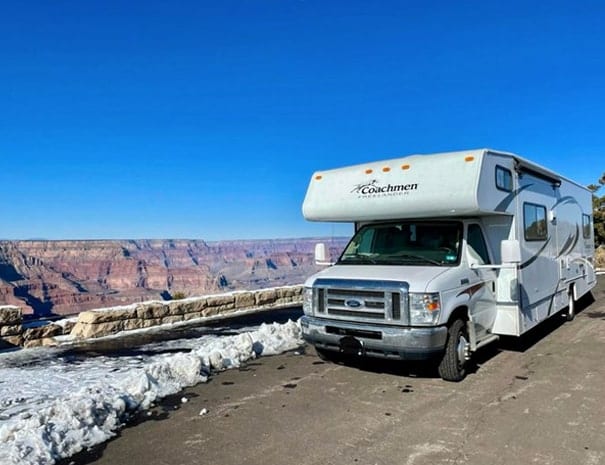
The family’s RV in Grand Canyon National Park on New Year’s Day 2021.
This moment — watching my kids explore new cultures, places and experiences — was exactly what I envisioned when, months earlier, I had decided to pack up my family and leave our rural New Hampshire home for an open-ended road trip around America.
It all started with a writing assignment. I was to report on three rural towns in America that were thriving, even during the coronavirus pandemic. As I wrote the story sitting on the porch next to my husband, I murmured, “It would be so great to see these places.” When he said, “Why couldn’t we?” I looked up.
As a freelance writer, I can work from anywhere. My husband is currently a stay-at-home dad. We had already decided that we would keep our 2-year-old home from day care because of the virus and that our 6-year-old would do homeschool for first grade. Couldn’t we accomplish all of this from the road?
For the next week, we both thought about the idea, together and apart. We focused on one question — Are we nuts? — and kept coming back to the same reply: What’s the worst that can happen?
The worst thing would be hating RV life and turning around, having wasted money. We had some savings that gave us security. Most importantly, we could Airbnb our home, and the revenue from that would cover the cost of campsites and gas. We calculated that if we bought an RV in the fall, off-season in New Hampshire, and sold it in the spring, prime season, we could pull this off without much out-of-pocket cost. Even if the trip wiped out our savings, we decided that the experience would be worth it. So, we bought an RV and hit the road, all within three weeks of having the idea.
That was 14,000 miles and nearly six months ago. We’ve realized that things work out best when we have no plan. We book one night at a time, stopping at places that catch our interest or, sometimes, anywhere that has a good internet signal so I can get some work done. To cut costs, we try to do free or lost-cost camping on federal land operated by the Bureau of Land Management, farm stays or state parks. But when the kids start driving us nuts, springing for a commercial campsite with a playground, pool and other families is worth every penny.

Sometimes, having four people living in a 32-foot RV is challenging. My kids love to wake up with the sun, and there’s nowhere to escape their early-morning chatter, so my husband and I have adopted a 9-to-5 sleep schedule, too. Since our bed is about two feet from their bunks, finding alone time can be impossible, and I’ve never appreciated a flimsy door more. Sometimes I fantasize about returning home to my washing machine, bathtub and dishes that aren’t plastic.
Our trip is shaped by the fact that we’re doing this during a pandemic. When we started the journey, we committed to staying COVID-conscious, avoiding places and situations where we wouldn’t be able to socially distance. That can be frustrating. We couldn’t camp in Yosemite or tour the prison at Alcatraz because of coronavirus precautions. We skipped San Diego when the county issued a stay-at-home order, and left Texas after a few days because there were too many people not wearing masks.
Despite the pandemic, we’ve seen many of America’s iconic landmarks. On day two of the trip, my older daughter’s jaw literally dropped when she saw Niagara Falls, and it forever changed her idea of what a waterfall could be. A few weeks later, my little one gasped and giggled at the bubbling geothermal mud-pots in Yellowstone. “They farted,” she said. That toilet humor was almost as good as when, in California, the girls watched a wild sea lion hang its butt off a dock to take a massive poo before belching. The kids still count running from the stench as a trip highlight.
It’s not all poop jokes, however — sometimes it’s spiritual. Standing beneath the red rock in Arches National Park in Utah made me feel that we’re nothing in the vast space and time of the universe. When we arrived at the Grand Canyon at sunset amid freshly fallen snow on New Year’s Eve, the beauty was so overwhelming that I had no room for thought at all.
Taking this trip at this moment, when the United States is fractured and hurting, has given me a newfound appreciation for this country.
Still, the real magic of the trip has been in the people we’ve met. In Idaho, we awoke one morning in a remote campsite to realize that our batteries were dead. We had just enough cell reception to call a big rig mechanic. My husband — an Australian immigrant — hung up the phone and said, “I must be losing it, because he sounded Aussie.” Sure enough, the man was a New Zealander who had lived for years in Sydney before emigrating to the U.S. He jumped the RV in two minutes, but stayed for five hours, shooting the shit with my husband about car racing and life as immigrants to the States.
Another night, we were staying on Bureau of Land Management land. We got the last campsite before a steep and potholed dirt road. When a van pulled in at dusk and the driver, a young single woman, realized she could go no further, my husband waved her into our site. “We know how stressful it is when it’s getting dark and you have nowhere to stay,” he said. As we shared a campfire, we chatted about why she hit the road with only her dog for company and what she’d learned along the way.
Then, there are the everyday interactions: The Louisiana swamp guide who called me “baby” in his thick accent as he talked about preserving Cajun culture for his kids; or the masked, gloved Californian who tossed a sequoia seed into our camper from six feet away, wanting to be sure my daughter understood the giant trees’ lifecycle of burning and rejuvenation. After the Capitol riots, a group of parents from all over the country shared our horror as we chatted while watching our kids swim together in an Arizona pool.
Taking this trip at this moment, when the United States is fractured and hurting, has given me a newfound appreciation for this country. When I’m down on the state of things, my husband, the immigrant, likes to remind me that no other government has tried to bring together such a diverse and large group of people. Driving around America, seeing how quickly the land and cultures change, has given me an understanding of the challenge in having truly united states. And yet, I’ve laughed and swapped stories with lots of people who I know have different beliefs and values than I do, connecting with each of them. That gives me hope.

I’ve realized that — as cliche as it sounds — I’m proud to be an American. Every time we visit a national park (and we’ve been to 12), I’m grateful for the foresight that our ancestors had to set this land aside. Before this, I’ve traveled the globe, but not my own country.
As a lifelong New Englander, I had assumptions about which parts of the country are best, and which are a bit backward. But actually getting to see those places has shattered my ideas. One of our favorite destinations has been Louisiana — a state that I thought would be a drive-through until the cooking, culture and kindness enveloped us and made us want to stay.
Since we started the trip — with most of our friends and family telling us how jealous they were — I’ve shared our adventure on social media. Each day, I post a picture and a story. It might be an animal (like the coatis of the Southwest or the nutria of the bayous), or a fact (Did you know the old London Bridge now resides in Lake Havasu, Arizona?). Other times, it’s a sweet moment, like when my 6-year-old woke me up with a frantic whisper: “Mom, there’s a buffalo in our campsite!” After living for 31 years in this country, I’ve realized there’s still so much about it that I have yet to discover.
That’s left me wishing that all Americans could take to the roads and see the country like we have. But I know it’s not possible. Our financial privilege and job flexibility allowed us to even consider the trip. Our child has no learning challenges, and she’ll bounce back from a year of being educated by haphazard homeschoolers. As cisgendered, straight, white people, we don’t need to worry about facing discrimination or the very real hate that some of our fellow travelers have to be concerned about.
My girls are only 2 and 6, so I know that they might not remember the details of this trip. When they get whiny or bored, I have to remind myself that where my husband and I see geological or historical wonders, sometimes the kids just see more rocks. But I hope that as this trip becomes folded into our family lore, my daughters will understand just how unique America is ― how we can honor different cultures and celebrate what we all still share and take pride in our homeland.
Burch, Kelly. “My Family Has Traveled In An RV For 6 Months, And It’s Changed How We See America.” HuffPost, 1 Mar. 2021, www.huffpost.com/entry/domestic-travel-live-rv-united-states_n_60368596c5b6dfb6a735d79f.
